“Fundamentally this is about the UK government making a choice to invest in medical innovation and the value that this brings.”
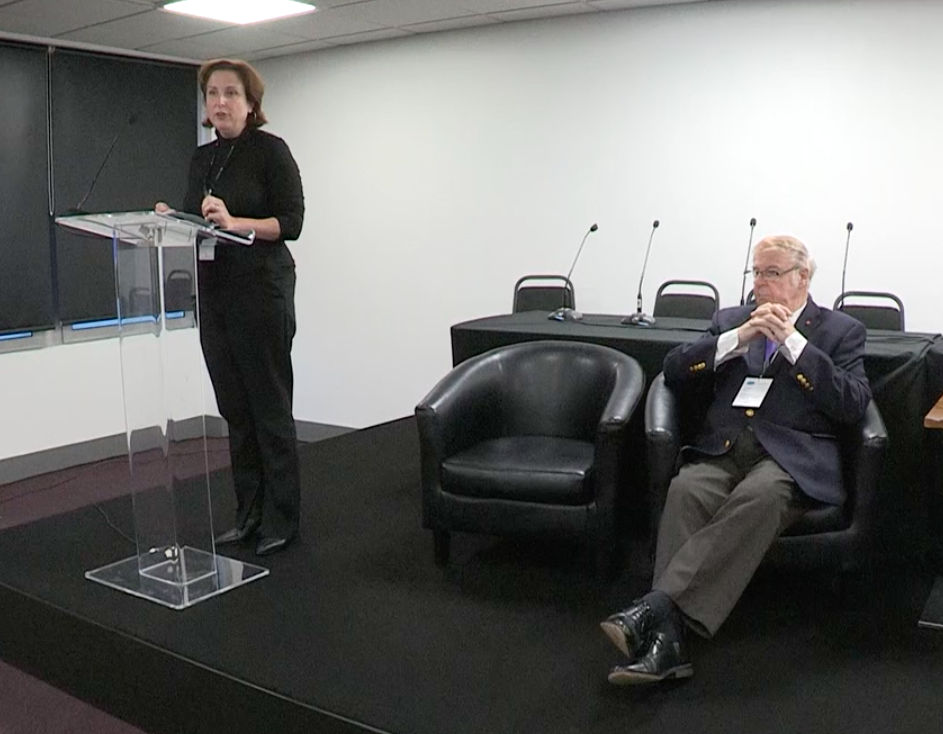
Susan Rienow
President, ABPI, Country President UK, Pfizer
Now in its twelfth year, Pharma Integrates is a pivotal event in the pharmaceutical calendar that sets the stage for industry leaders to converge, exchange insights, and navigate the evolving landscape of disease control.
Trevor Jones CBE, the opening speaker of this year’s event, underscored its significance as a key annual gathering that shapes the trajectory of the pharmaceutical sector. In his address, Trevor acknowledged “We are on the brink of some incredible new approaches to disease control but at the same time we face a lot of pressures as an industry.”
Susan Rienow, Country President UK at Pfizer and President of the ABPI followed by inviting attendees to look into the future. In her vision, Susan painted a picture of the UK as a science superpower. She imagined a scenario where a person diagnosed with a rare cancer could swiftly access a new therapy through a clinical trial. The seamless process involved regulatory approvals from the MHRA and NICE, ultimately leading to the treatment’s approval for use in the NHS.
Susan acknowledged, however, that the current reality falls short of this ideal scenario. She underscored the diminishing likelihood of late-stage clinical trials for rare cancer medicines in the UK, citing a decline from 4th to 10th place in international league tables for hosting third-phase clinical trials since 2017. Susan identified challenges in gaining global approval for the UK as a launch market and emphasised the country’s significant decrease in its global share of new medicine launches.
Highlighting a pivotal solution, Susan emphasized the importance of creating an environment conducive to company growth. She connected this to proposals offering direct financial support for the NHS. Citing a compelling statistic — “For every pound invested in health services, it brings £4.67 worth of economic benefits to the UK.”
Susan Rienow concluded by highlighting “Fundamentally this is about the UK government making a choice to invest in medical innovation and the value that this brings.”
Fireside Chat
Pharma CEO Plenary Discussion: View from the top – navigating the opportunities and challenges presented by a dynamic UK environment and achieving success.
“Patients deserve more, and it is not acceptable that if I live in a different country, I have a 20 year life span difference.”
– Fireside chat
Tamsin Berry, Head of Policy and Partnerships at AreteiaTx and Partner at Population Health Partners, spoke of the commonalities of the participants’ careers, emphasising their wealth of experience, global leadership, and dedication to innovation and patient outcomes. Speakers were Susan Rienow, Country President UK at Pfizer and President of the ABPI, Marie-Andrée Gamache, Country President of Novartis UK and Ireland, and Dr Antonio Payano, Chief Executive Officer at Bayer UK & Ireland.
Tamsin started by posing a thought-provoking question to the participants, asking them what had excited them the most in the past five years.
Antonio responded by acknowledging the global collaboration in response to COVID-19 and technological advancements. He also shared a personal achievement of working in Central Africa to get 100 million women into the workforce.
Marie-Andrée focused on the UK, praising the national collaboration on cardiovascular and breast cancer initiatives. She emphasised the need for impactful work that doesn’t merely collect dust on a shelf, expressing optimism about the industry’s potential to achieve significant goals through collaboration.
Susan highlighted the industry’s scientific response to the pandemic, addressing global supply chain issues, and stressed the importance of partnerships in achieving extraordinary outcomes. She said, “I am evangelistic about the potential for us to be able to get to a place in the UK where we can do extraordinary things where system partners work towards a common goal.”
The conversation shifted to taboo topics in the industry that need addressing for success. Antonio pointed to the surprising issue of drug pricing, highlighting its impact on the value of people’s lives over time stating, “Now because of inflation people’s lives are worth 60% less of what they used to be when pricing was originally set up 20-30 years ago.” Marie-Andrée discussed the need for a “triple win” agreement emphasising, “A solution has to work for the NHS, it has to work for patients, and it has to benefit the company. It’s okay to have a common goal.” Susan brought attention to the public’s limited awareness of the pharmaceutical manufacturing process, “There’s a reality check where most people don’t think very much about who makes their medicines or how they come to be on a day-to-day basis.”
When asked what they would do if they were the prime minister, Antonio advocated for viewing healthcare as an investment rather than a cost, recognising the incredible potential of the country. Marie-Andrée envisioned running the country like a CEO, prioritising data-driven decisions and addressing disparities in patient outcomes. “Patients deserve more, and it is not acceptable that if I live in a different country, I have a 20 year life span difference.” Susan echoed these sentiments and added a focus on prevention and a whole-system, mission-led approach, drawing on the effective collaboration observed during the COVID-19 pandemic.
The fireside chat delved into the speakers’ excitement about global and national collaborations, tackled taboo issues in the industry, and explored their visions if they were to lead the country, emphasising healthcare as an investment and the need for data-driven decision-making and prevention strategies.
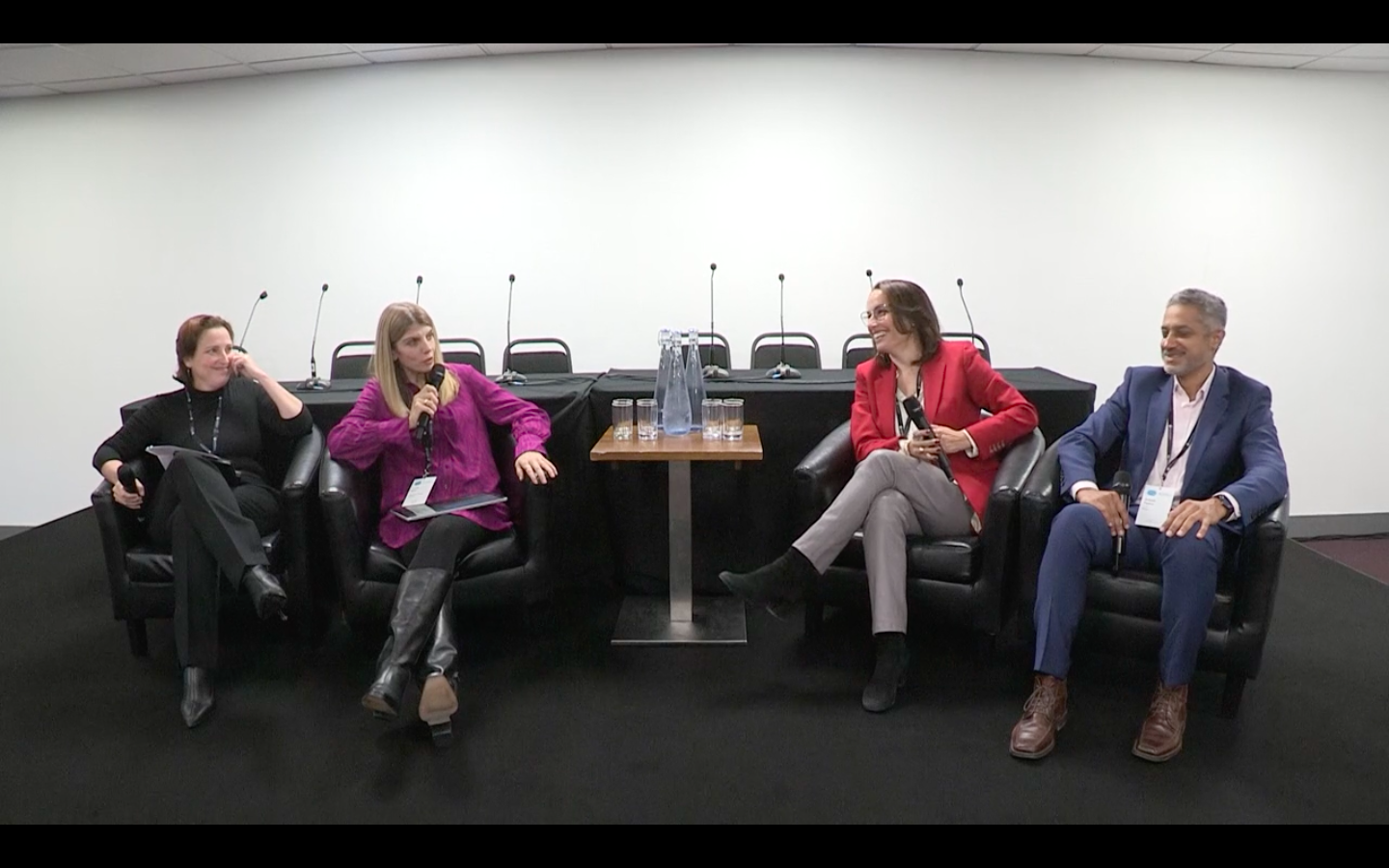
Speakers include:
Susan Rienow | Country President UK, Pfizer | President, ABPI
Marie-Andrée Gamache | Country President | Novartis UK and Ireland
Dr Antonio Payano | Chief Executive Officer | Bayer UK & Ireland
Interviewed by:
Tamsin Berry | Head of Policy and Partnerships, AreteiaTx | Partner, Population Health Partners
Panel Discussions Track 1:
Big Health Issues and Technology
How do we tackle some of the biggest health challenges, such as chronic conditions, respiratory and cancer?
How can we use technology to improve health outcomes, improve sustainability and create robust supply chains?
“Businesses need to commit to being totally transparent about what their AI models are going to do, what data is being held and what those algorithm decisions are.”
– Session 1: ‘AI – ‘intelligent’ or simply ‘artificial’?
‘
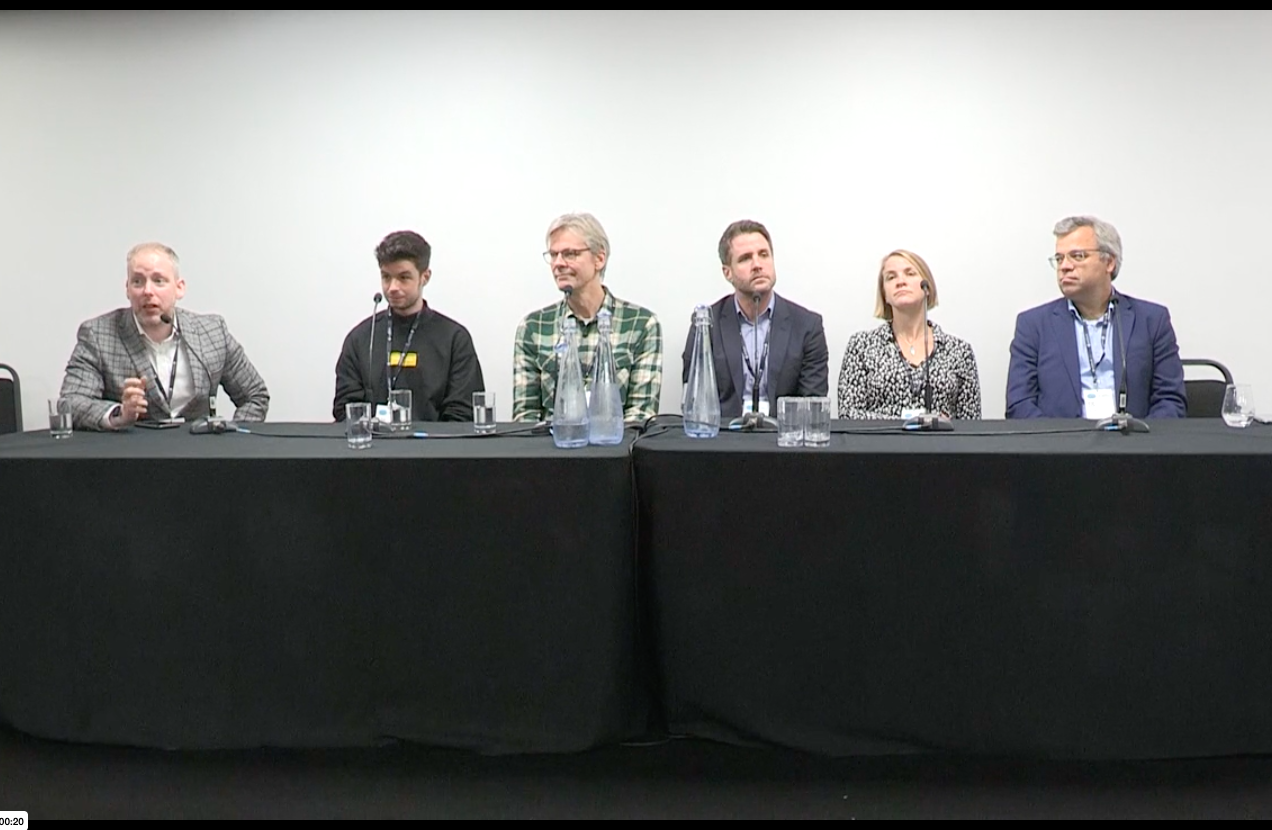
FACILITATED BY
Phil Carvil | Head of Clusters (NW) | UKRI Science and Technology Facilities Council
PANELLISTS
Jenny Barnett | Chief Executive Officer | Monument Therapeutics
Joshua Blight | Chief Executive Officer & Co-Founder | Baseimmune
Casper Wilstrup | Chief Executive Officer | Abzu
Jorge Costa | Life Sciences Industry Consultant | Emerson
Jonathan Smith | Co-Founder & Director | Veraxis
Track 1, Session 1: AI – ‘intelligent’ or simply ‘artificial’?
Our first panel of the day began with evaluating the role of AI in the pharmaceutical industry chaired by Phil Carvil, Head of Clusters (NW) at the UKRI Science and Technology Facilities Council, and featuring Jenny Barnett, Chief Executive Officer at Monument Therapeutics, Joshua Blight, Chief Executive Officer & Co-Founder at Baseimmune, Casper Wilstrup, Chief Executive Officer at Abzu, Jorge Costa, Life Sciences Industry Consultant at Emerson, and Jonathan Smith, Co-Founder & Director at Veraxis.
Josh started by explaining “AI is a fantastic tool that we can wield but it needs to be grounded in science. AI is not always the right tool for the job.”
Casper supported Josh’s point by adding, “One of the things AI can do is it can create very accurate predictive models about which we understand nothing whatsoever. So, we can sometimes end up in a situation where under certain conditions we can predict who will benefit from a certain drug. However, most of us here probably come with a scientific mindset and in science you actually care about the why of things.”
Jonathon then touched on some of the ethical considerations that businesses should be thinking about where he emphasised, “Businesses need to commit to being totally transparent about what their AI models are going to do, what data is being held and what those algorithm decisions are.”
Jenny highlighted an enormous gap for patients in neuroscience and psychiatry with the data being used to make decisions and the need for better linking of the patient to the right treatment.
Jorge spoke about the opportunities and challenges in the product development manufacturing stage and gave examples of how centralised data systems can benefit faster decision making, highlighting where and when products may need to be replaced when they are approaching calibration expiration or have some sort of malfunction.
The panel highlighted the opportunities for AI in the pharma industry but also that there was still a lot of work to be done to increase the quality of data collection and our understanding of how it works.
“It’s about building an ecosystem where collaboration is the norm.”
– Session 2 ‘Can the NHS and pharma work together to solve the burden of long-term diseases?’
Session 2: Can the NHS and pharma work together to solve the burden of long-term diseases?
With long term health conditions affecting about a third of the population and taking about 80% of the NHS’s current spend, Tim Ringrose, Chief Executive Officer at Cognitant, and panellists; Ian Philip, Founder of Age Care Technologies, Sheuli Porkess, Chief Medical Officer and Business Unit Director at Precisia Life Sciences, a C2-Ai business, Rina Newton, Co-Founder of Code Clarity, Joep Hufman, Country Medical Director UK & Ireland at Bayer Pharma, and Stephanie Campbell, Founder & Chief Executive Officer at OKKO Health, asked the question, can industry and the NHS work together to productively solve the burden of long term diseases.
Ian began by talking about the historical relationship between the pharma industry and the NHS. He highlighted, “The system in government is complex but nevertheless it is possible to form a concordant partnership that would be a benefit to patients, benefit the public, benefit the exchequer and be beneficial to industry, providing that it is mission led and integrates all parties.”
Joep agreed and highlighted the importance of maintaining the partnership as a “pendulum that swings that needs to be rebuilt every few years.” He added, “Everything works well for a few years and then from either the NHS side, the pharma side or for a legal matter we let the partnership dwindle and all the fruits which it bore get lost.”
Rina spoke about a positive example of this collaboration in the diabetes space, where 10 or so companies that were each other’s competitors, got together and worked towards a common goal. “It’s about building an ecosystem where collaboration is the norm.” This was a message that was emphasised by Stephanie who spotlighted an example in eye care where patients who received successful treatment did not have an improvement in their wellbeing 10 years later. “To look at a patient centric approach to eye care, pharma works with patients to optimise visual outcomes, but we’ve also got to work with NHS partners to optimise the treatment pathway that isn’t just an injection in their eye but looking at what other services that patient needs.”
Continuing the discussion about patient empowered health journeys and using technology to facilitate this, Sheuli spoke about the relationship between both pharma and the NHS using technology to help triage waiting lists and how it can work with patients who are waiting for treatment to prepare for their operations by improving their general health.
Towards the end of the discussion, panellists highlighted the potential of social media as a communication tool and noted the need for more to be done to tackle miscommunication and to make the most of media that people already consume.
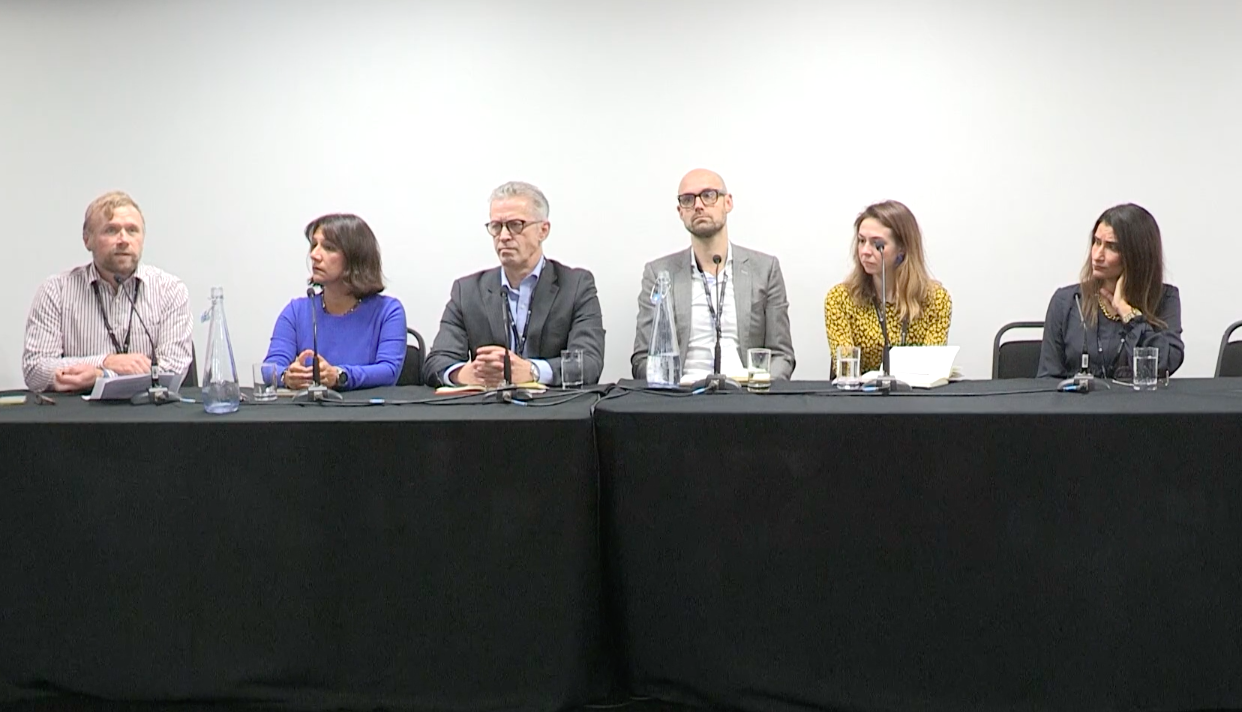
FACILITATED BY
Tim Ringrose | Chief Executive Officer | Cognitant
PANELLISTS
Ian Philp | Founder | Age Care Technologies
Sheuli Porkess | Chief Medical Officer and Business Unit Director | Precisia Life Sciences, a C2-Ai business
Rina Newton | Co-Founder | Code Clarity
Joep Hufman | Country Medical Director UK & Ireland | Bayer Pharma
Stephanie Campbell | Founder & Chief Executive Officer | OKKO Health
“Life sciences has shifted away from mergers and acquisitions and towards the partnering model which has shown a 33% better return on investment.”
– Session 3 ‘Partnering – for better or for worse?
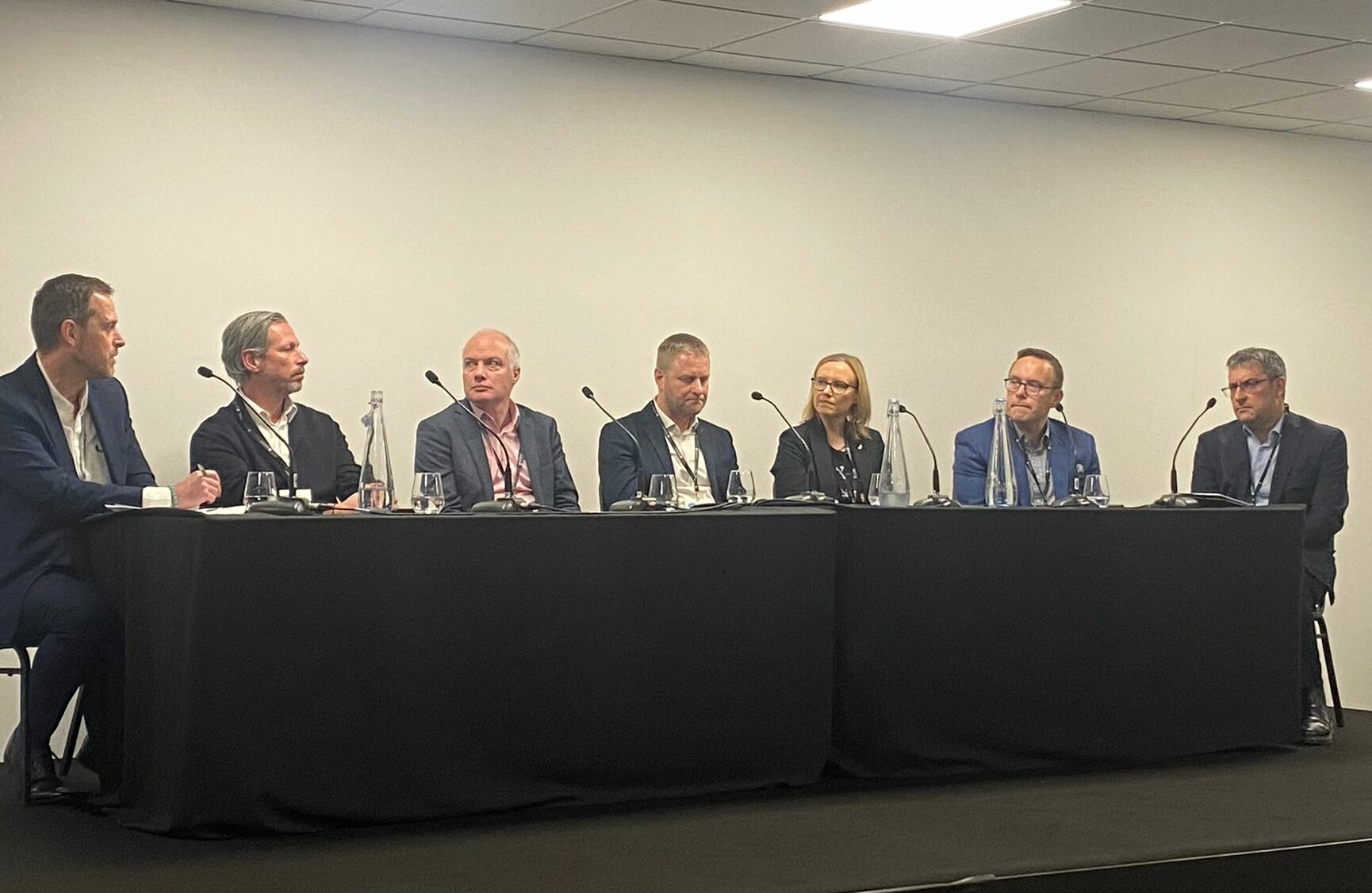
FACILITATED BY
Brennan Miles | Head of Drug Delivery | Team Consulting
PANELLISTS
Christian Jones | Chief Commercial Officer | Nanoform
David Harrison | Senior Director, Head of Device Manufacturing Partnerships | UCB
Chris Davison | Chief Executive Officer | Custom Pharma Services
Dave Wightman | Director, External Development and Manufacturing | AstraZeneca
James Fry | Partner and Head of Life Sciences | Mills & Reeve
Olivia Boyce | Director of Project Management | SK biotek
Session 3: Partnering – for better or for worse?
In ‘Partnering for better or for worse’, facilitated by Brennan Miles, Head of Drug Delivery at Team Consulting, and featuring Christian Jones, Chief Commercial Officer at Nanoform, David Harrison, Senior Director at UCB, Chris Davison, Chief Executive Officer at Custom Pharma Services, Dave Wightman, Director at AstraZeneca, James Fry, Partner at Mills & Reeve) and Olivia Boyce, Director of Project Management at SK Biotek, panellists discussed their experiences of the way partnering has changed in the last 15 years and what that means for innovation and getting developments to market. To begin Brennan underlined a significant shift, “Life sciences has shifted away from mergers and acquisitions and towards the partnering model which has shown a 33% better return on investment.”
Dave began by talking about his experiences at a large pharma that has shifted towards an outsourcing model but explained, “It’s not just about a transactional arrangement and I think we wouldn’t have seen such a success if it was … It’s taken an investment of effort of not just legal and procurement but technical to technical collaboration and by investing time into the relationships.” Chris agreed from the point of view of a CDMO, “We become part of their organisation, we are the experts that help drive that and we know that your standards are high, and you need to get it right. That’s why building broader infrastructure is very relevant.”
James then spoke from a legal perspective in forming these partnerships saying, “With each new project it’s learning new stuff, so IP is always going to be a touchpoint in negotiations but some of the more tricky issues tend to be around ancillary issues such at tech transfer.” David also added, “You can’t treat partners like contract manufacturers, and you have to respect each other’s IP and that’s how partnering has changed. Because healthcare has changed, technologies we need access to bring innovative drugs to new patient populations has changed, and it’s not something we can do alone.” This sentiment about respect in partnering was continued by Olivia saying, “A deal is like a marriage prenup – you hope you never have to see it again because the real secret sauce in partnering is the relationship person to person.”
The conversation then moved onto problem solving together as partners, with panellists highlighting the importance of an aligned approach to problem solving. Christian ended the panel looking to the future in the current investment market by asking “How can we create creative partnerships so we don’t lose innovation coming through from smaller companies that are struggling to raise capital and make sure we can be smart together to make sure those assets do still succeed in development.”
““At the end of the day no matter how robust a supply chain is, no matter how well something is manufactured, if it doesn’t get to the patient in the way it needs to then what is the point?””
– Session 4, ‘Technology – a new link in a broken supply chain?’
’
Session 4: Technology – a new link in a broken supply chain?
The Covid pandemic brought a sharp focus on the fragility of supply chains. Our panel ‘Technology – a new link in a broken supply chain’ facilitated by Managing Director of Royal Health, Stefan Kulik, and featuring Richard Vellacott, Chief Executive Officer at BiologIC Technologies, Jagjit Singh Srai, Director of Research at the University of Cambridge, Manjit Jhooty, Chief Executive Officer of Jhoots Group, and Hui Yi Tee, Business Development Manager at Nanoform, answered the questions; Has this driven a lasting trend for onshoring manufacturing capabilities and embracing new tech to streamline supply? How are distribution models changing? And how quickly are we moving to greener supply chains?
Stefan started the panel by bringing focus on how the use of technology can be disrupted and embraced to make things better for the future. Richard focused on the importance that innovations in engineering biology will have but cautioned “The productivity crisis we have at the moment is struggling to get basic science at the lab bench into industrial scale manufacturing, but I do see that in the next decade there is going to be a fundamental shift in supply chains and big industrial companies are really examining their source of materials at the moment. Whether it’s Lego looking at sustainable sources for their plastics, down to cosmetics through to pharmaceuticals.”
Hui spoke about strategies across the industry that are changing supply chains and started by drawing attention to hesitancy in the pharma industry and taking a risk to try something new. “At the end of the day no matter how robust a supply chain is, no matter how well something is manufactured, if it doesn’t get to the patient in the way it needs to then what is the point?”
Jagjit then discussed the need to invest in supply chains in the UK and that from a customer perspective, all they care about is why they haven’t got their tablets. “The communication bit is important, so I think digital enablement is going to be important.”
Following on, Manjit spoke about the paradox of too much inventory in the system but still stock outages. “The fundamental issue is that there is very little transparency on where inventory sits and unlike Amazon Prime, where I know where my product is until it gets to my door, in the pharmaceutical industry there is very little clarity on where the product is and when it is going to arrive.” Manjit also finished by questioning how our current system will cope with niche patient populations or personalised medicines.
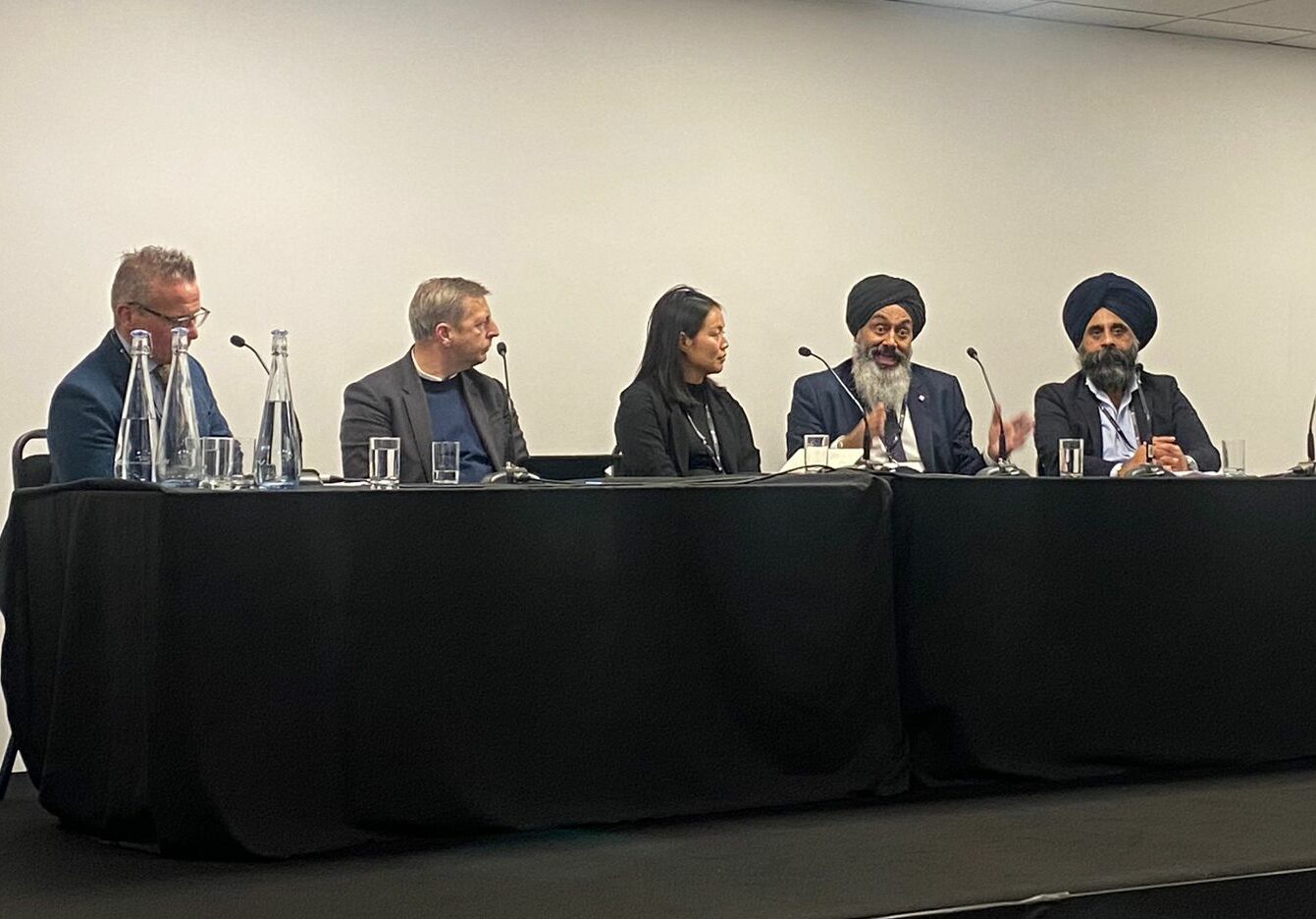
FACILITATED BY
Stefan Kulik | Managing Director | Royal Mail Health
PANELLISTS
Richard Vellacott | Chief Executive Officer | BiologIC Technologies
Jagjit Singh Srai | Director of Research | University of Cambridge
Manjit Jhooty | Chief Executive Officer | Jhoots Group
Mark Buswell | Vice President, Quality Tech | GSK
Hui Yi Tee | Business Development Manager | Nanoform
““The secret of a successful partnership is creating collaborative teams.”
– Session 5, ‘Big CDMO, Small CDMO’
Session 5: Big CDMO, Small CDMO
‘Big CDMO, Small CDMO’ facilitated by Christophe Le Ret, Global Marketing Director at Umicore, and featuring Steven Facer, Vice President of Business Development at Adare Pharma Solutions, Martin Doorbar, Chief Development Officer; Non Clinical at Ellipses Pharma, Claire Thompson, Chief Executive Officer at Agility Life Sciences, Giuliano Perfetti, Chief Executive Officer & Managing Director at Jubilant Biosys, and Valeria Ciarnelli, Senior Director of Product Development at Quotient Sciences, addressed the question of how the modern manufacturing landscape will be shaped due to the rise of ‘mega CDMOs’ and what the resulting implications are for smaller and more specialised CDMOs.
Giuliano started the panel with his thoughts on the two major factors in this industry trend: the historic origin of CDMOs from the acquisition of former big pharma sites, and the natural desire of the bigger players wanting to become a one stop shop for big pharma. Claire then offered insight by looking at what is it that the client needs. “Three c’s: Capability, can you solve their problem? Capacity: can you do it quickly and Cost.”
Martin spoke from the perspective of using CDMOs stating, “We’ve tended to use larger organisations because they have that long runway to commercialisation but when they don’t have the skill set you need plug and play partnerships with smaller boutiques to help solve very specific problems along the way.
“I believe in integration,” followed Valeria. “The secret of a successful partnership is creating collaborative teams.”
On the decision of where and who to manufacture with, Steven spoke about organisations chasing cost savings and the industry moving its capabilities from western markets to China. Giuliano added, “We moved our geographies without solving the problem and we are just exporting our pollution. I think to export is wrong in principle and is not anymore, an option. We need to come back and invest in new technology to make sustainable production.”
The panel finished with Christophe asking if there is the same risk of a disruptor, such as AI, like Tesla was for automobile industry, coming into the pharmaceutical industry? Giuliano replied, “The true question is how we can really benefit from this disruptor and in our organisation really accelerate development.”
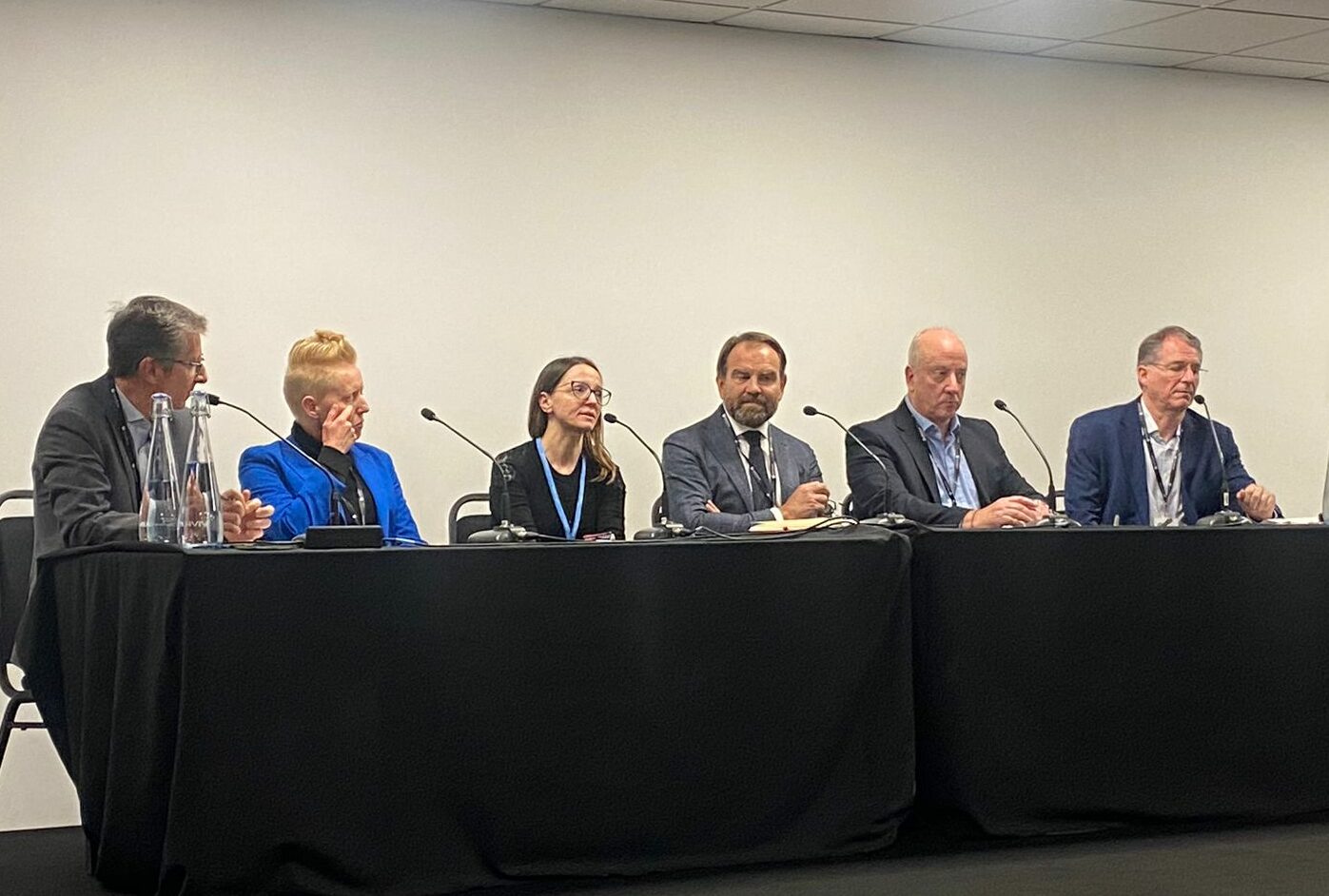
FACILITATED BY
Christophe Le Ret | Global Marketing Director | Umicore
PANELLISTS
Steven Facer | Vice President of Business Development EU/ROW | Adare Pharma Solutions
Martin Doorbar | Chief Development Officer; Non Clinical | Ellipses Pharma
Claire Thompson | Chief Executive Officer | Agility Life Sciences
Giuliano Perfetti | Chief Executive Officer & Managing Director | Jubilant Biosys
Valeria Ciarnelli | Senior Director, Product Development | Quotient Sciences
Panel Discussions Track 2:
Big Health Issues and Enablers
How do we tackle some of the biggest health challenges, such as chronic conditions, respiratory and cancer?
How do we enable a better Industry, through creating diverse skilled teams, empowering the patient and navigating the economic and regulatory environment?
“I remember talking about this thirty years ago, why is it all taking so long? Is this because we haven’t changed or is it because we’re continuing to change and there are more opportunities ahead?”
– Session 1: ‘Have a little ‘patients’
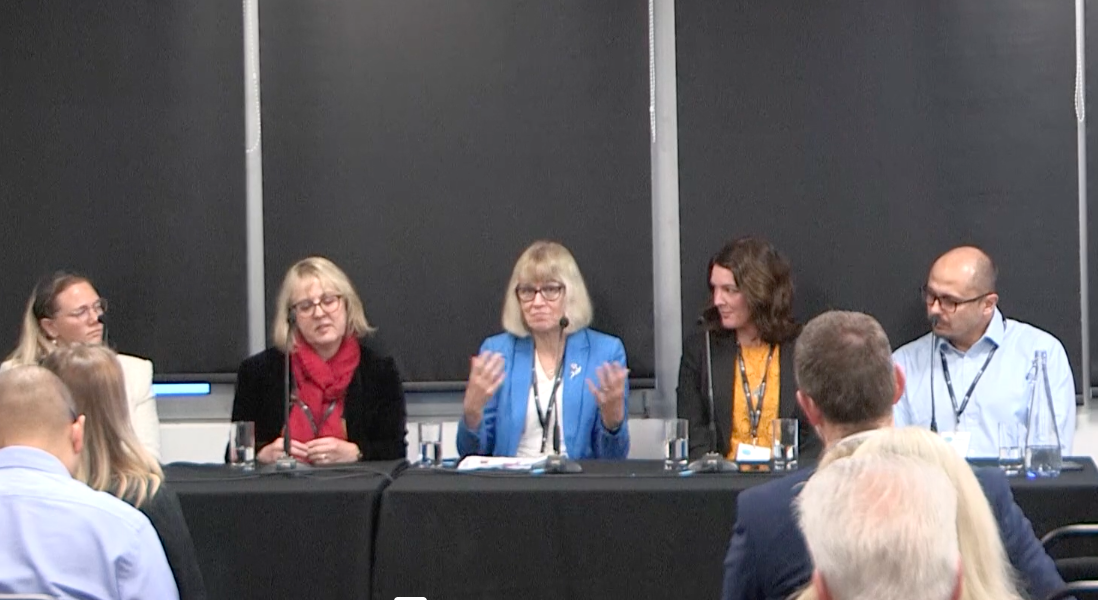
FACILITATED BY
Kathryn Simpson | Business Consultant | Kathryn Simpson Consulting Limited
PANELLISTS
Charlotte Harris | Head of Front End Innovation | Team Consulting
Oleksandr Gorbenko | Global Patient Affairs Director | Ipsen
Catherine Kettleborough | Translational Challenge Leader | LifeArc
Abigail Epstein | Head of Communications and Patient Advocacy | Takeda
Track 2, Session 1: Have a little ‘patients’
With an ever-evolving health system, the patient voice is getting louder in all aspects of healthcare, from self-diagnosis to policy discussion and clinical trial design. Panel facilitator Kathryn Simpson, Business Consultant at Kathryn Simpson Consulting Limited, started by talking about her interest in patient centred care “I remember talking about this thirty years ago, why is it all taking so long? Is this because we haven’t changed or is it because we’re continuing to change and there are more opportunities ahead?”
Answering her questions on the panel were Charlotte Harris, Head of Front-End Innovation at Team Consulting, Oleksandr Gorbenko, Global Patient Affairs Director at Ipsen, Catherine Kettleborough, Translational Challenge Leader at LifeArc, and Abigail Epstein, Head of Communications and Patient Advocacy at Takeda.
The panel started by thinking about the capabilities to engage with patients. Charlotte began coming from a medical device perspective by stressing that their focus is on understanding what it is like to be a patient and cope with what they are dealing with. “It’s really about understanding the context your product’s going to be used in. It’s really important that we understand what the patient is going through. We need to use rich patient insights and apply these to technology, study, and device design.”
Abigail spoke about the need to engage patient populations from the very beginning of clinical trials. Oleksandr continued, “Involving patients at stage two or stage three it is too late, everything should be designed five, seven, ten years before hand so that there is a clear path on how to move forward. Our main approach is involving patients from the start. This is critical for every industry in Pharma.”
The panel finished by talking about patient mapping of their journey from first symptom to diagnosis to treatment and the importance of sharing a goal to work together.
“This is an innovation-based industry, the fact is we want a diverse workforce because with that comes diverse thought.””
– Session 2, ‘Britain’s got talent’
Session 2: Britain’s Got Talent
As our ability to treat diseases becomes ever more advanced, the skills gap across the pharmaceutical sector continues to grow. Our panel ‘Britain’s Got Talent’ answered the question: how can we upskill our workforce, better manage talent, and encourage diversity to drive innovation? Facilitated by Jane Kennedy, Chief Business Officer at Discovery Park, and featuring panellists Fiona Marston, Chair & Chief Executive Officer of Erebagen, Nick Smith, Regional Operations Manager at Scitech, Amina Udechuku, Head of Vaccines, UK at Takeda UK, and Andrew Croydon, Director, Education and Examination Policy & Partnerships at the ABPI.
Jane began the panel by asking how unique is the UK’s talent base and how can it be leveraged to maintain our science superpower status? Andrew spoke about the importance of telling the story and thinking about perception, “This is an innovation-based industry, the fact is we want a diverse workforce because with that comes diverse thought.”
Amina continued talking about opportunities and widening participation, “Equity is about giving people what is fair to come to the race in the same place and having the tools that are necessary to compete with others in the space”.
Fiona then spoke about the challenges of inspiring and recruiting a diverse workforce, explaining, “In the hospital I’m a board member of, we have a saying that is ‘a face like mine’ and that means going out and showing students that who you are and where you come from, doesn’t actually stand as a barrier to what you can achieve.”
The panel then focused on recognising non-traditional routes into the life science industry, celebrating the skills and talents of young people and the importance of creating parity and access into organisations throughout somebody’s career.
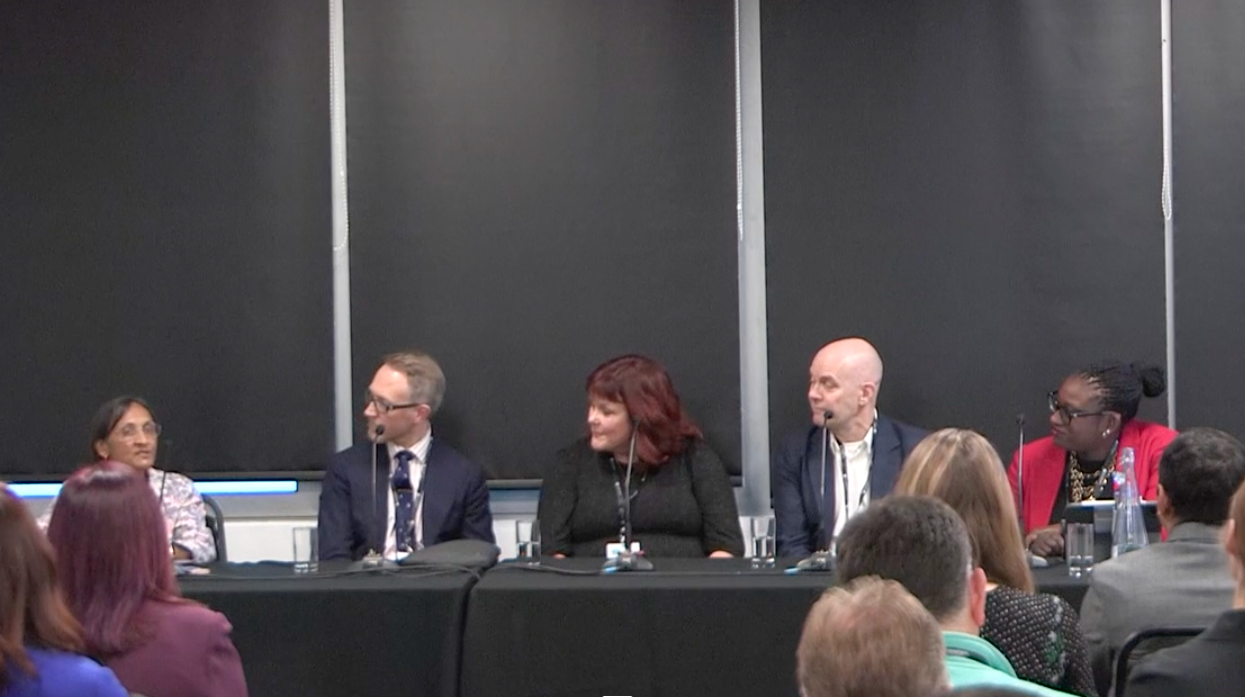
FACILITATED BY
Jane Kennedy | Chief Business Officer | Discovery Park
PANELLISTS
Fiona Marston | Chair & Chief Executive Officer | Erebagen
Nick Smith | Regional Operations Manager | Scitech
Amina Udechuku | Head of Vaccines, UK | Takeda UK
Andrew Croydon | Director, Education and Examination Policy & Partnerships | The ABPI
“There is no one size fits all, there is no magic pill that’s going to solve this problem but understanding individuals is at the core of prevention.”
– Session 3: ‘From sick care to health care’
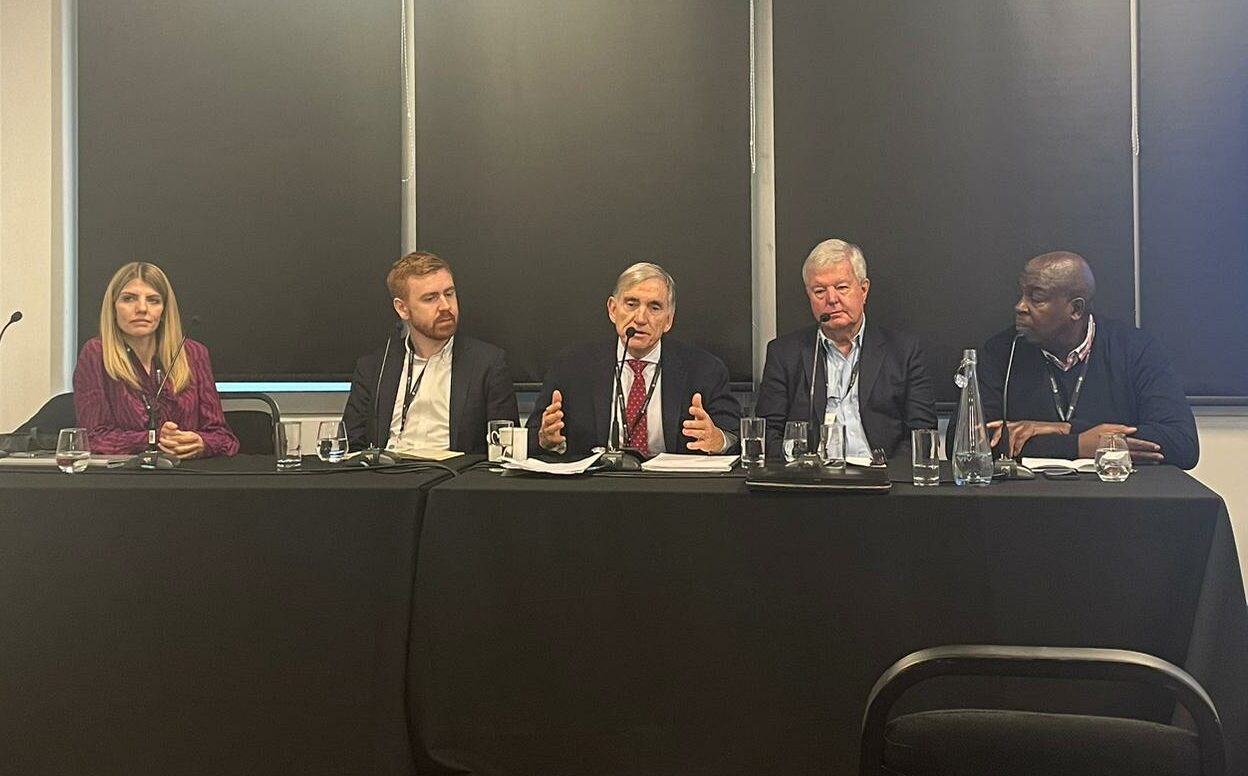
FACILITATED BY
John Deanfield CBE | Professor of Cardiology | University College London
PANELLISTS
Marcel Gehrung | Chief Executive Officer and Co-Founder | Cyted
Cedi Frederick | Chair | NHS Kent and Medway
Tamsin Berry | Partner & Head of Policy and Partnerships | AreteiaTx & Population Health Partners
Sir Keith Mills GBE DL | Chairman | Camelot
Session 3: From ‘sick care’ to ‘health care’
With NHS demand outstripping capacity, we must focus on preventative healthcare. Our panel discussed how can we turn a ‘sick care’ service into a ‘health care’ service that supports a healthier and wealthier nation?
Facilitated by John Deanfield CBE, Professor of Cardiology at University College London, and featuring Marcel Gehrung, Chief Executive Officer and Co-Founder of Cyted, Cedi Frederick, Chair of NHS Kent and Medway, Tamsin Berry, Head of Policy and Partnerships at AreteiaTx and Partner at Population Health Partners, and Sir Keith Mills GBE DL, Chairman of Camelot.
John Deanfield began by clearly defining the issue in healthcare, “We’ve improved life expectancy in the population by 19 years in the last 50 years, but we have not changed the proportion of people living with ill health. This issue cannot be solved with better medical care of patients who are sick, we need to move upstream towards tackling the demand element of healthcare.”
On the challenge of working within the current system, Cedi explained, “We’re working in a space that requires long-term thinking and consistent approach, but chances are we will be part of another five-year cycle. It’s a real challenge.” He continues, “Of course prevention must be our number one objective but at the moment we are being pushed, understandably and rightly, to address a whole series of short-term challenges.”
On the challenge of encouraging behaviour changes, Tamsin said “We tried very much at Public Health England to help people change their behaviour and actually it turns out it is really difficult.”
Keith further explained some of the difficulty with encouraging behaviour change, “We are the only industry that doesn’t reward our customers for success.” In elaborating on how to approach a solution, Keith said, “There is no one size fits all, there is no magic pill that’s going to solve this problem but understanding individuals is at the core of prevention.”
Marcel also spoke about strategy and highlighted three main areas in the context of innovation adoption: an evidence-based approach, cost efficiency and scalability.
“The key thing is surfing the edge between patient involvement and technology. Trials are not just about tech but about communicating with the patient, answering the questions, and distilling confidence in your product and ability.””
– Session 4: ‘Trialling a new approach to clinical trials’
Session 4: Trialling a new approach to clinical trials
Starting the panel, Lord James O’Shaughnessy, Senior Partner at Newmarket Strategy, gave an update of the government review of commercial clinical trials published earlier this year and the subsequent implementation plan.
He was joined by panellists James Chennells, Head Exploration & Discovery R&D Data Science & Artificial Intelligence at Bayer, Paul Wicks, Independent Consultant at Wicks Digital Health, Miranda Mapleton, Chief Executive Officer at White Swan, and Nina Skorytchenko, Co-founder & Chief Executive Officer of Avenna.
James began by sharing his experience of decentralised trials and said, “When running a decentralised arm of a trial, to make life easier for the patient you need a simplified and flexible protocol as the starting point and without that you will definitely fail.” He also spoke about introducing an innovative approach and the need to have sensible precautions, “There is a safety net with only a capped percentage of patients being in the virtual trial so the data from others is still usable if there is a problem.”
Paul then added that while there is new tech innovating clinical trials he emphasised, “The key thing is surfing the edge between patient involvement and technology. Trials are not just about tech but about communicating with the patient, answering the questions, and distilling confidence in your product and ability.”
Miranda then furthered the conversation about the importance of being cautious about tech, “Data is underused. when designing a trial, you need to look at the holistic approach to the patient and also be aware that data does not tell the whole story.”
Nina Skorytchenko brought the conversation back to efficiency, “We’ve been talking about the different elements and design of clinical trials but how about the optimisation and improving the efficiency of clinical trial design and implementation?”
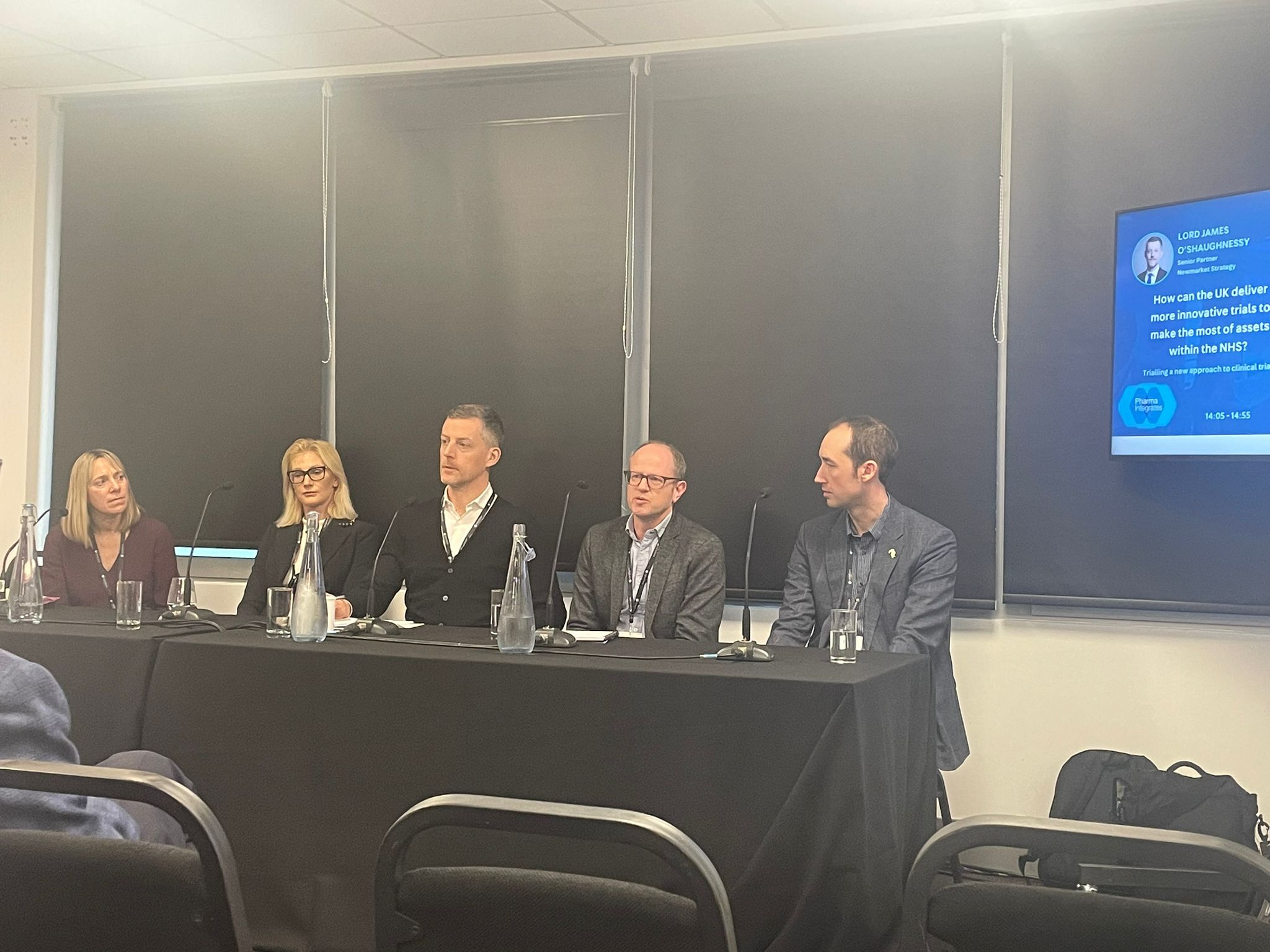
FACILITATED BY
Lord James O’Shaughnessy | Senior Partner | Newmarket Strategy
PANELLISTS
James Chennells | Head Exploration & Discovery R&D Data Science & Artificial Intelligence | Bayer
Paul Wicks | Independent Consultant | Wicks Digital Health
Miranda Mapleton | Chief Executive Officer | White Swan
Nina Skorytchenko | Co-founder & Chief Executive Officer | Avenna
“So, when we set about doing this, we kind of had a mantra of it’s got to be accessible, it’s got to be affordable, it’s got to be safe, and we’ve got to be able to compete with the big boys on efficacy.”
– Session 5, ‘But does it sell?’
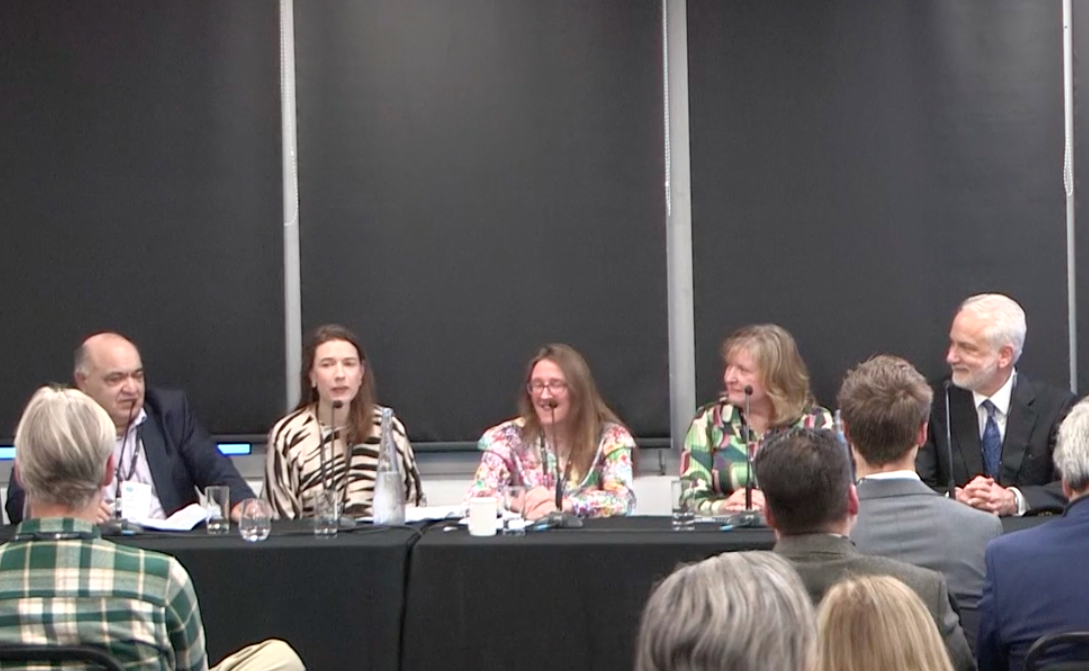
FACILITATED BY
Martino Picardo | Chairman | Discovery Park
PANELLISTS
Suzanne Dilly | Chief Executive Officer | ValiRx PLC
Camilla Easter | Chief Executive Officer | Oxford Medical Products
Hilary Mills-Baker | European Quality and Validation Manager | Emerson
Andrew Webb | Chief Executive Officer | Extruded Pharmaceuticals
Session 5: But does it sell?
Regulatory and commercialisation strategies can make or break the success of new treatments. Martino Picardo, Chairman at Discovery Park, facilitated ‘But does it sell’ featuring panellists Suzanne Dilly, Chief Executive Officer of ValiRx PLC, Camilla Easter, Chief Executive Officer of Oxford Medical Products, Hilary Mills-Baker, European Quality and Validation Manager at Emerson, and Andrew Webb, Chief Executive Officer of Extruded Pharmaceuticals.
Hilary began by talking about one of the first hurdles in streamlining the drug approval journey, “Right from when you are developing a drug, you need to look at not just what’s critical to make that drug work in a patient but what are the critical process parameters to make out.”
Suzanne then highlighted her thoughts on the two things to look at when assessing science coming out of university, “Firstly can you develop it? And will it sell on the market?”
Camila spoke about the impact of price point, and while if effective an expensive drug will sell, like Ozempic, but added, “We can’t be having these divides in society where some people can address a disease that is shortening their lives by 10 years and other can’t. So, when we set about doing this, we kind of had a mantra of it’s got to be accessible, it’s got to be affordable, it’s got to be safe, and we’ve got to be able to compete with the big boys on efficacy.”
Martin then expanded with the context of orphan drugs and repurposing known products. “With the brain tumour population, on a good side it is not a huge population, but it is a very bad situation for the people themselves, so we want to make this available to all. This kind of cost of goods really underpins what we are doing.” This was continued by Hilary who spoke about what advice Emerson offers to these companies, “It’s about what are the efficiencies early on, what is the validation strategy, so we are testing things that need to be tested before manufacturing only once.”
The conversation then moved to discussing the cost of impact of regulation, quality management, and using data to increase efficiencies across the process.
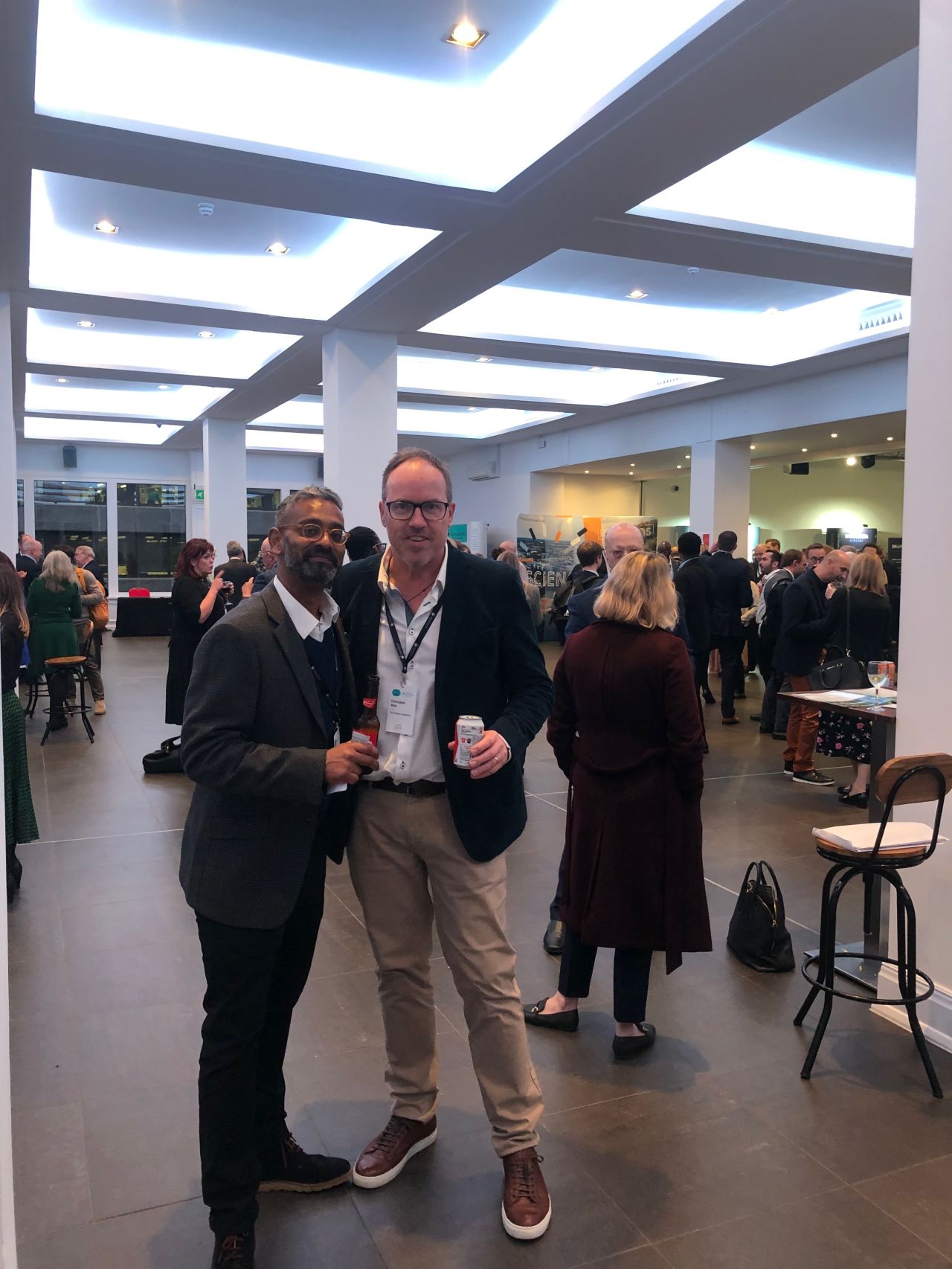
Samuel Thangiah and Christopher Watt, Life Science Integrates
Facilitating collaboration to drive forward the pharmaceutical industry
“Pharma Integrates is the highlight of our event programme and always attracts key players across pharma and healthcare. Delegates and speakers have been keen to connect with peers, discuss how to overcome market challenges and generate new thinking that will, ultimately, lead to improvements in the delivery of healthcare, and patient outcomes,” said Christopher Watt, Executive Director, Life Science Integrates.
“The calibre of speakers this year has been as high as ever, reflecting the value of Pharma Integrates to senior leaders across the healthcare spectrum. In a rapidly changing landscape, there is so much to think about, whether around drug discovery, patient access, policy changes, or clinical trials.” added Samuel Thangiah, Executive Director, Life Science Integrates.
“As a community, we continue to drive progressive change and Life Science Integrates plays an important role in facilitating change and innovation across the sector.”
Thank you to all our sponsors, partners and speakers who have made our event possible, and we look forward to having everybody back next year.

